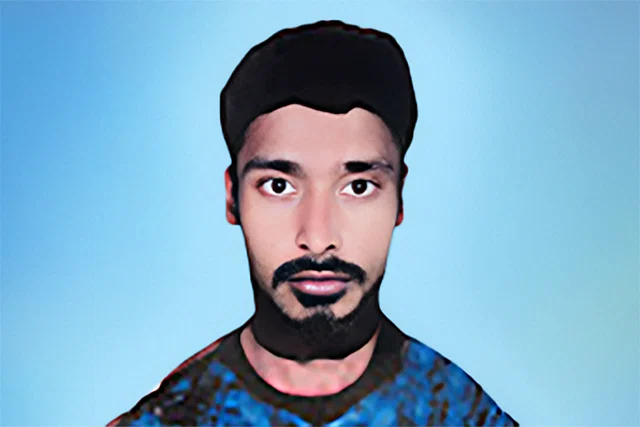That morning, without eating anything, Roni Pramanik (28) set out with his battery-powered auto-rickshaw. Around noon, his wife Shamima Khanam called to check on him. She had urged him to come home early due to the bad condition of the roads. Roni replied from the other end, “I haven’t gathered the installment money yet. Don’t worry. I’m out with the rickshaw. I’ll come home as soon as I get the money.”
On July 20, Roni never returned. Later, his relatives found out that he had been shot dead in the chest during a clash centered around the quota reform movement. His body was kept at Enam Medical College Hospital in Savar.
Roni’s home was in Panchdash village in Buriganj Union of Shibganj Upazila, Bogura. He lived with his wife and two young children in a rented place in the Delta Mor area of Savar. He supported his family by driving a battery-powered rickshaw. Recalling her last conversation with her husband, Shamima Khanam lamented yesterday, “Roni, you told me on the phone, ‘Don’t worry,’ but you left me alone in this world. Why did you leave me with so much tension for the rest of my life?”
Roni’s father, Dilbar Rahman Pramanik, passed away long ago. Roni was the eldest of two siblings. He had two sons, five-year-old Yasin and one-and-a-half-year-old Ivan. After Roni’s death from the gunshot, his family was plunged into mourning.
Yesterday, in Panchdash village, we spoke to Roni’s mother, Shahana Begum (65). She was nearly mad with grief after losing her only earning son. Shahana Begum recounted that when Roni was seven, she moved to Savar with her husband. Roni started working in a garment factory at a young age. She also worked in the factory with her husband and son. With their combined earnings, they married off their daughter, Shilpi Khatun. After her husband’s death, Shahana returned to the village. She had no place to stay, so she built a makeshift house on government land. Roni lived in Savar with his wife and children and supported his family by driving a rickshaw. He also sent some money to his mother every month. With his earnings, four people were able to eat.
Shahana cried out, “What harm did my son do to anyone? He left the house early without eating to drive his rickshaw. In the evening, he was brought back as a corpse after being shot. They shot my son like a bird!”
Relatives revealed that both Roni and Shamima worked in the same garment factory, where they met and later married in 2015. Shamima’s paternal home was in Mojumda village of Maksudpur Upazila, Gopalganj. Her father had passed away earlier, leaving her with only her mother, Beauty Begum.
Shamima explained that two years ago, Roni had taken a loan from an NGO and started a vegetable business in Savar, selling fresh vegetables from a van. The business incurred losses, leaving him desperate. He had to pay weekly installments of 2,000 taka and monthly installments of 3,000 taka, besides the 3,000 taka house rent. The pressure made Roni go out with the rickshaw every morning and return home late at night after earning throughout the day.
Shamima said that on the morning of July 20, Roni left with his rickshaw. The last time she spoke to him was around 1:30 PM, when he said he would return home once he gathered the installment money. Around 5 PM, she received a call from Roni’s phone. Someone on the other end said Roni was no more, and his body was at Enam Medical College Hospital. She saw the bullet-ridden body and the blood-soaked shirt when she arrived. The hospital authorities urged her to take the body away quickly and initially refused to issue a death certificate, eventually providing a handwritten note.
Desperate, Shamima left their rented home in Savar and sought shelter with a relative.
Roni’s younger sister, Shilpi Khatun, said, “My brother was the heart of our family. His wife, two little children, and elderly mother depended on his earnings. What will happen to my sister-in-law now? Who will look after the two orphaned children? Who will take care of our mother?”
Rezaul Karim, Chairman of Buriganj Union Parishad in Shibganj Upazila, said Roni Pramanik supported his elderly mother, wife, and two sons by driving a rickshaw in Savar. The family has become helpless and destitute due to his death in the violence. He assured that the union parishad would try to support the family.
